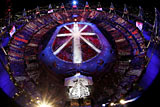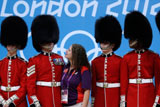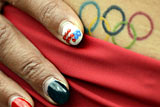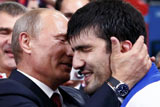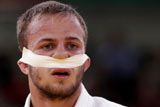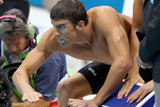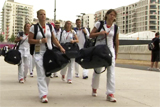
Beach Volleyball
Updated: 2012-05-14 16:16:23
(london2012.com)
|
|||||||||||
Beach Volleyball came of age on the sun-soaked beaches of Santa Monica, California, during the 1920s. Over the last three decades, the sport has moved far beyond its roots and is now played all over the world. Teams of two will serve, bump and spike their way towards gold at the London 2012 Games competition held in the heart of the capital.
 |
Competition dates
July 28 - Aug 9
Competition venue
Horse Guards Parade
Number of medal events
One men's and one women's competition.
Number of competitors
48 men and 48 women.
Twenty-four teams compete in both the men's and women's competitions, with two athletes on each team. Each country is limited to one men's and one women's team.
Field of play
The Beach Volleyball court is 16m long and 8m wide and has a sandy surface. It is divided into two halves by a net that is 2.43m high for the men's game, and 2.24m high for the women's.
History of Beach Volleyball at the Olympic Games
Beach Volleyball made its Olympic debut at Atlanta 1996. Since then it has become one of the most popular spectator sports at the Games. The London 2012 competition will be held at a special temporary arena on Horse Guards Parade, just steps from Trafalgar Square. It will be covered in 3,000 tonnes of sand.
The basics
Beach Volleyball is similar to the indoor game but with two main differences. The court is covered in sand and situated outdoors, and the game is played by teams of two, instead of teams of six.
The sport is played with a ball weighing between 260g and 280g and made of synthetic leather. The object of the sport is to land the ball in the opposition's half of the court. After the serve, each team is allowed three touches of the ball before it must cross over the net to the opposition.
Competition format
At London 2012, both the men's and women's Beach Volleyball events begin with a preliminary phase: the 24 teams in each event are divided into six pools of four, and each team plays every other team in their pool. A total of 16 teams from this phase qualify for the knockout phase - the top two teams from each pool and the best two third-ranked teams advance automatically. The four remaining third-ranked teams play a two-match lucky loser round; the two winning teams in the lucky loser round also qualify for the elimination phase. The winners of the semi-finals eventually go head-to-head for the gold.
All matches are the best of three sets, with 21 points needed to win a set (15 in the third and deciding set).
Officials
Two referees oversee each game. One sits on an elevated chair at the side of the court and the second is positioned on the other side of the court. They are assisted by scorers and line judges.
Keys to success
Beach Volleyball is a fast and physically demanding game. Height is a distinct advantage, but players also need to have speed, strength and stamina, as well as excellent technical skills and the ability to think on their feet and play tactically as a pair.
Breaking the rules
Like Volleyball, Beach Volleyball is a very technical game, and a team that commits too many infringements, such as an assisted hit or serving fault, gives away penalties and loses possession. For a serious offence a player can be excluded for the remainder of the set - rendering the team incomplete for that set. On rare occasions a player can be excluded for the remainder of the match - leaving the team incomplete and unable to finish the match.
Jargon buster
Spike - to smash the ball overarm into the opponent's court.
Block - preventing the attacking ball from coming over the net by forming a wall of hands at the net.
Dig - a defensive passing shot from close to the ground, usually following an opposition spike.
Setter - the player who sets the ball for the attacker, usually on the second of the team's three permitted shots.
Wipe - to return the ball off an opposing block so it lands out of bounds.
Medal Count |
||||
| 1 | 46 | 29 | 29 | |
| 2 | 38 | 27 | 22 | |
| 3 | 29 | 17 | 19 | |
| 4 | 24 | 25 | 33 | |
| 5 | 13 | 8 | 7 | |
| 6 | 11 | 19 | 14 | |
